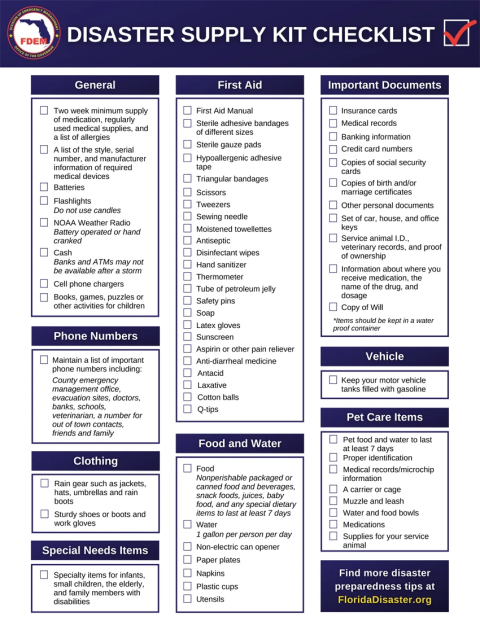Hurricane Preparedness
- Know your zone.
- If you are ordered to evacuate, know the local hurricane evacuation route(s) to take and have a plan for where you can stay. Contact your local emergency management agency for more information.
- Snap photos of important documents and save them online or in a secure place you can access during an emergency
- Put together a go-bag: disaster supply kit, including a flashlight, batteries, cash, first aid supplies, medications, and copies of your critical information if you need to evacuate
- If you are not in an area that is advised to evacuate and you decide to stay in your home, plan for adequate supplies in case you lose power and water for several days and you are not able to leave due to flooding or blocked roads.
- Make a family emergency communication plan.
- Many communities have text or email alerting systems for emergency notifications. To find out what alerts are available in your area, search the Internet with your town, city, or county name and the word “alerts.
Building An Emergency Supplies Kit
Being prepared means having your own food, water and other supplies to last for at least 72 hours. A disaster supplies kit is a collection of basic items your household may need in the event of an emergency. Make sure your emergency kit is stocked with the items on the checklist below.
Image

Preparing Your Home
- Hurricane winds can cause trees and branches to fall, so before hurricane season trim or remove damaged trees and limbs to keep you and your property safe.
- Secure loose rain gutters and downspouts and clear any clogged areas or debris to prevent water damage to your property.
- Reduce property damage by retrofitting to secure and reinforce the roof, windows, and doors, including the garage doors.
- Purchase a portable generator or install a generator for use during power outages. Remember to keep generators and other alternate power/heat sources outside, at least 20 feet away from windows and doors and protected from moisture; and NEVER try to power the house wiring by plugging a generator into a wall outlet.
- Consider building a FEMA safe room or ICC 500 storm shelter designed for protection from high-winds and in locations above flooding levels.
FEMA CONTACT
FEMA has information to help you prepare for, respond to, and recover from disasters specific to your location. Florida is in region 4 under FEMA’s classifications. For specific Florida disaster relief please visit FEMA Assistance. You can also:
- Download the FEMA app to receive real-time alerts from the National Weather Service.
- Sign up for community alerts in your area and be aware of the Emergency Alert System (EAS) and Wireless Emergency Alert (WEA) - which requires no-sign up.
- Visit Ready.gov/hurricanes or Ready.gov/es/huracanes (en Español) for more readiness tips.
The websites below provide additional resources you and your family may find useful.